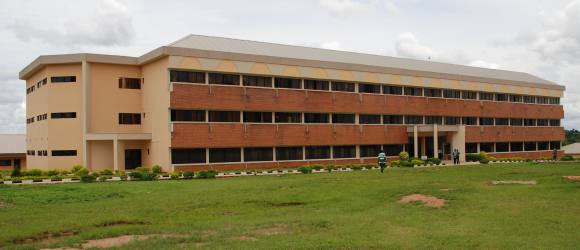Content




| For further enquiries, please call +2348036513089 or +2348093319655 | ||||||||||||||||
|
||||||||||||||||
| COMPUTER TRAINING ACADEMY | ||||||||||||||||
|
||||||||||||||||
Mrs. Tewogbade -- Deputy Registrar(Council Affairs Unit)
The Council Affairs Unit as the name implies, is in charge of all Council matters. As the property and finances of the University are vested in Council, the Unit is in charge of the implementation of all policies formulated by Council.
The Unit, as is true of all other units in the Registry, operates through the Committee system. Apart from Council itself, there are important Committees such as the Procurement Committee which is in charge of all contract awards in the University; the Finance and General Purposes Committee which considers all financial matters on behalf of Council and makes appropriate recommendations thereon to Council; the Appointment and Promotions Committee (Academic, Administrative and Technical and Junior Staff) respectively and the Honorary Degrees Committee among others. Council is very important to the University at large as it represents the interest of Government in the University.
Mr. Adeniyi - Deputy Registrar (Personnel Affairs) The Personnel Affairs Unit deals with all staff matters. The unit is divided into the;
The Personnel Affairs Unit deals with all staff matters. The unit is divided into the;
• Academic Staff Establishment Sub-Unit
• Administrative and Technical Staff Sub-Unit
• Junior Staff Sub-unit
Each of the units is being manned by appropriate officers. The unit is coordinated by a Principal Assistant Registrar who is responsible to the Registrar on the activities of the Unit.
The Unit also operates the Committee system in the performance of its duties. Among others, the Unit is responsible to Council through the Appointment and Promotions Committee (Academic, Administrative and Technical and Junior Staff).
It is responsible for the appointment, promotion and discipline of staff as the case may be. The unit is the point of entry and exit into and from the University for all categories of staff.
Mr. ABIODUN, Adesoji Odetunde - Deputy Registrar (Academic Affairs Unit)
 The Academic Affairs Unit is also a very important arm of the Registry because it is in charge of academic matters which is the very essence of the University. The Unit also operates through three major subdivisions such as Senate, Admissions as well as Examinations and Records all of which also operate through the Committee System.
The Academic Affairs Unit is also a very important arm of the Registry because it is in charge of academic matters which is the very essence of the University. The Unit also operates through three major subdivisions such as Senate, Admissions as well as Examinations and Records all of which also operate through the Committee System.
Senate is the highest academic body of the University and it is responsible for decisions on all academic matters in the system. Because of the enormity of its businesses, Senate operates through an array of Committees such as the Committee of Provosts, Deans and Directors, Business Committee of Senate, Development Committee, Academic Matters Sub-Committee, Learned Conferences Support Committee, among others. Senate is responsible for policies guiding the admission and graduation of students in the University.
The Admissions Sub-Unit of the Academic Affairs Unit as the name implies, is responsible for the admission of students into the University and it performs this function through the Admissions Committee. This Committee does not just admit but it also carries out verification of results (from all examining bodies) of all students admitted into the University each year.
Another crucial function of the unit are the arrangement for examinations as well as the keeping of student records. This is done by the Examinations and Records Sub-Unit of the Academic Affairs unit. This function is performed by the sub-unit in relation with the Heads of departments, the Deans and the Provosts of the Colleges. This sub-unit is very important to the Academic Affairs Unit as its functions have implications for the credibility of the certificates issued by the University.
THE REGISTRY DEPARTMENT
The Registry is the Secretariat of the University and it is the center-nerve and the rallying point of all administrative activities in the University. The Registry is headed by the Registrar who is responsible to the Vice-Chancellor for the day-to-day administration of the University.
For the smooth and efficient running of the Registry as a department, it is divided for now into the Registrar’s main office, the Council Affairs Unit, the Personnel and the Academic Affairs Unit. The Registrar’s main office coordinates the activities of these other units apart from its involvement in the policy formulation and implementation of the University.
The Council Affairs Unit
The Council Affairs Unit as the name implies, is in charge of all Council matters. As the property and finances of the University are vested in Council, the Unit is in charge of the implementation of all policies formulated by Council.
The Unit, as is true of all other units in the Registry, operates through the Committee system. Apart from Council itself, there are important Committees such as the Procurement Committee which is in charge of all contract awards in the University; the Finance and General Purposes Committee which considers all financial matters on behalf of Council and makes appropriate recommendations thereon to Council; the Appointment and Promotions Committee (Academic, Administrative and Technical and Junior Staff) respectively and the Honorary Degrees Committee among others. Council is very important to the University at large as it represents the interest of Government in the University.
The Personnel Affairs Unit
The Personnel Affairs Unit deals with all staff matters. The unit is divided into the Academic Staff sub-unit, Administrative and Technical Staff sub unit and Junior Staff sub-unit with each of them being manned by appropriate officers. The unit is coordinated by a Principal Assistant Registrar who is responsible to the Registrar on the activities of the Unit.
The Unit also operates the Committee system in the performance of its duties. Among others, the Unit is responsible to Council through the Appointment and Promotions Committee (Academic, Administrative and Technical and Junior Staff).
It is responsible for the appointment, promotion and discipline of staff as the case may be. The unit is the point of entry and exit into and from the University for all categories of staff.
The Academic Affairs Unit
The Academic Affairs Unit is also a very important arm of the Registry because it is in charge of academic matters which is the very essence of the University. The Unit also operates through three major subdivisions such as Senate, Admissions as well as Examinations and Records all of which also operate through the Committee System.
Senate is the highest academic body of the University and it is responsible for decisions on all academic matters in the system. Because of the enormity of its businesses, Senate operates through an array of Committees such as the Committee of Provosts, Deans and Directors, Business Committee of Senate, Development Committee, Academic Matters Sub-Committee, Learned Conferences Support Committee, among others. Senate is responsible for policies guiding the admission and graduation of students in the University.
The Admissions Sub-unit of the Academic Affairs Unit as the name implies, is responsible for the admission of students into the University and it performs this function through the Admissions Committee. This Committee does not just admit but it also carries out verification of results (from all examining bodies) of all students admitted into the University each year.
Another crucial function of the unit are the arrangement for examinations as well as the keeping of student records. This is done by the Examinations and Records Sub-unit of the Academic Affairs unit. This function is performed by the sub-unit in relation with the Heads of departments, the Deans and the Provosts of the Colleges. This sub-unit is very important to the Academic Affairs Unit as its functions have implications for the credibility of the certificates issued by the University.
Email:
The National Universities Commission (NUC) on realization of the need to put in place some management structure that would guide the orderly academic development of the University in the performance of its statutory functions of teaching, research and development as well as public service proposed and established the Academic Planning Unit in Nigerian Universities in the early 1980’s. Establishment of the Academic Planning Units in Nigerian universities is in response to the need to coordinate and streamline the academic policies and activities arising from sudden and sometimes uncoordinated growth, development and proliferation of programmes and units in the university system. Academic Planning Unit also handles the collection and management of data and information to guide the academic development of universities while ensuring compliance with NUC’s Minimum Academic Standards (MAS) and with the university senate’s academic regulations. Structure of the Academic Planning Unit The Academic Planning Unit is an integral part of the Vice Chancellor's office and headed by a Director. The Academic Planning Unit of Osun State University is currently headed by headed by Dr. M. O. Abanikannda, an Associate Professor of Computing/IT Education. The Director of Academic Planning Unit is complimented by other staff members. These include the Academic Planning Officer, Secretary, and Clerical Staff/Office Assistant.
Functions of Director of Academic Planning:
The Director of Academic Planning of Osun State University is responsible to the Vice-Chancellor in the general superintendence over the academic and administrative affairs of the Academic Planning Unit which include the following:
1. Coordination and collation of information to National Universities Commission (NUC) for national planning purposes.
2. Promotion of the quality of teaching, learning and research in the university through periodic evaluation of academic activities in the University Monitoring and advising on the growth of department and establishment of positions in various units of the University and advise the Vice-Chancellor on the creation of new positions;
3. Monitoring the FTE (Full Time Equivalent) students enrolment in relation to staff strength; Guide academic and related units of the University on the operations of the Academic Brief and participate in the review of the academic Brief and general curriculum development, as at when due;
4. Liaise with National Universities Commission (NUC) on matters relating to academic planning and quality assurance including the University System Annual Review Meetings (USARM), system-wide programme audit, and other academic matters that may be of interest and benefit to the University;
5. Coordinate and ensure compliance of academic and other units of the university with NUC guidelines on academic and other matters; Process proposals for the creation of new Departments and introduction of new programmes;
6. Coordinate and guide academic units/departments for purposes of programme accreditation and continuous quality assurance;
7. Coordinate and ensure the provision of conductive teaching, learning and research environment in the University;
8. Monitor the efficient and effective utilization of academic resources; Participate in the review of academic programme curricular of the University and evaluation of proposal for new academic programmes;
9. Generate and periodically update the University databank/statistics on academic and other matters and make necessary projections for the attention of the Vice-Chancellor; Generate policies for and identify priorities in the academic development of the University for the consideration of senate through the development committee;
10. Recommend desirable changes in the academic and administrative structures of the University to the Development Committee;
11. Participate in the preparation of the University Annual Budget; Maintain a computer based data bank on student and staff statistics for use in planning, budgeting and other management requirements
12. Carry out all other duties assigned by the Vice-Chancellor.
Philosophy:
The philosophy of the Academic Planning Unit is to enhance efficiency in pursuit of the mandate of the University and to ensure the generation, dissemination and publication of qualitative ideas, information and knowledge.
Vision:
To provide cutting-edge and excellent academic planning service with global standard.
Mission:
The mission of the Directorate of Academic Planning is to establish an integrated planning mechanism for the accomplishment of the goals of the University in order to ensure the operations are directed towards achieving stated objectives.
Activities:
It is the responsibility of the Unit to synthesize all data available in the University for the publication of the University Statistical digest. Specifically, the Unit’s functions are as follows:
- Planning
- Preparation of Academic Brief
- Curriculum Development and Evaluation
- Preparation of Annual Recurrent Estimates Monitoring of Resource Allocation and Utilization
- Accreditation of Degree Programmes - Collation and publication of data on Staff and Students
- Liaison with other Colleges, Schools, Departments and Units
- Data Base Management
Community Empowerment Service Project:
The University, as it is its practice, engaged in quite a number of community related services in the period under review. The highlights of these are presented as follows:
(i) Health Related Service/Engagement:
(a) Hepatitis B Awareness Campaign - The College of Health Sciences organized a public lecture to raise the awareness of members of the public on Hepatitis B and provided free Hepatitis B screening exercise for many people. The title of the lecture was “Global Elimination of Viral Hepatitis by 2030” and it was delivered a professor of Medicine and Consultant Gastroenterologist / Hepatologist, Professor D. A. Ndububa on 21st may, 2024.
(b) Awareness campaign on Mental Health – The College of Health Sciences organized its students of Medicine and Surgery to conduct an awareness campaign in the Osogbo Community in the month of November 2023. The campaign was on for 2 days and students seized the opportunity to counsel members of the public on the importance of mental health, lifestyles that precipitate bad mental health, and the need to seek medical advice any time they sensed symptoms of abnormal mental health.
(c) Community Health Outreach for UNIOSUN-Campus Hosting Communities The University undertook community health outreach services to the following towns hosting each of its Campuses: Osogbo, Okuku, Ejigbo, Ikire, Ifetedo and Ipetu-Ijesa. The exercise involved basic tests and diagnosis, as well as free medications for minor ailments.
(ii) Renovation of Patrol Vehicles for the Police: The University did a complete overhaul of two (2) dysfunctional police patrol vehicles and handed them back to the police to enhance their effective security surveillance and functionality. One of the vehicles was overhauled and given back to the Ipetu-Ijesha divisional police office while the other was done for the Oja-Oba division.
(iii) Reconstruction of Osun Grove/Isale-Osun Bridge As part of its corporate social responsibility, the University reconstructed the bridge that links the College of Health Science, Isale-Osun Campus to the Osogbo Community. That was a bridge with an average daily vehicular passage of 300 and thousands of pedestrians. It is the same bridge that links the Osun Grove. The bridge collapsed and made the road unpassable for months before the University took up the reconstruction in May 2023.
(iv) Massive farm product sale at cheap prices to members of the public: The University’s College of Agriculture, through its Teaching and Research farm, embarked a massive farming and farm produce within the period. On weekly basis, the Farm sold such the following food items to members of the public: cassava, garri, rice, cucumber, eggs, dried fish, honey, etc. The items were sold at very cheap rate compared to the prevailing food prices in town at the time.
(v) Lectures on Topical issues of Public Interest: The University organized quite a good number of public lectures that immensely benefitted members of the public within the period. Some of these include:
(a) Public lectures on topical issues and issues of public importance organised by the University Colleges.
(b) Inaugural lectures delivered by Professors with a large number of members of the public.
You are sincerely welcome to Bursary department of Osun State University. This is the department saddled with the responsibility of keeping financial records of the University. Our goal is accuracy and integrity in order to play our role in achieving the University vision and mission. The department is blessed with many professional Accountants certified by Institute of Chartered Accountant of Nigeria who are also mentoring young ones who are aspiring to be professionals and contribute meaningfully to the development of the University. The department consists of eight units and the Bursar’s office serves as the clearing and coordinating office .Thank you and have a blessed day.
Our function is to keep financial records of the University. Advise the Vice Chancellor on financial issues, relate with External and government auditors and other supervising agents on financial matters.
The Bursary Department is responsible for all financial transactions in the University and is headed by the Bursar. The department comprises of seven (7) units saddled with one responsibility or the other. Each of the unit has a unit head who oversees the affairs of the unit and is directly responsible to the Bursar who from time to time delegates duties.
The following are the Units in Bursary Department with their respective heads of unit:
| Department | Head of Unit | Designation |
| Budget and Expenditure | Mr. R. Ejidokun | Principal Accountant |
| Cash Office | Mr. B. A. Adefila |
Principal Exec. Officer (Accts) |
| Cash Book Mgt & Reconciliation | Mr. Hammed Adams | Accountant I |
| College Accounts and Programmes | ||
| Science, Engineering & Technology | Mrs. Makinde-Ojo | Accountant I |
| Management & Social Sciences | Mrs K. F. Adeagbo | Executive Officer (Accts) |
| Agriculture | Mr Isaiah Fayemi | Senior Executive Officer(Accts) |
| Humanities & Culture | Mrs. F. O. Omisakin | Account Officer |
| Law | Mr. O. J. Lawal | Asst. Exec. Officer (Accts) |
| Health Sciences | Mr. Faniran | Executive Officer (Accts) |
| Final Accounts | Mr. S. A. Adegbite |
Deputy Registrar |
| Payroll and Salaries Administration | Mrs. Serifat Fatoki | Accountant I |
| Students Account | Mrs. Temitope Ojoniyi | Senior Accountant |
| Business Investment Grants and Insurance | Mr. A. S. Adebambo | Senior Accountant |
 General Introduction
General Introduction
The College of Science, Engineering and Technology is one of the six Colleges that took off at the inception of the Osun State University and the 80th University in Nigeria. The College was established to cater for the needs of students in Science, Engineering and Technology, and in particular to offer teaching, research and community service in these areas. The vision, mission, philosophy and objectives of the College are in tandem with that of the University.
Philosophy
To continually respond to the changing imperatives in Science, Engineering and Technology and seek to raise men and women imbued with the requisite skill, knowledge and competencies in Science, Engineering and Technology, to be arrow heads of the socio-economic and technological development of Osun State in particular and Nigeria in general.
Mission
In a bid to achieve its mission, the College of Science, Engineering and Technology shall be firmly committed to offering students of widely varied ages, backgrounds, interests and needs, a broad range of educational opportunities and experiences in Science, Engineering and Technology which will enable them to function as productive members of the society
Location
The College is located at the main Campus of the University in Okebaale area of Osogbo, the State Capital Of Osun State. The College is currently having Six (6) Departments with students admitted into their programmes.
Research and Innovation
The Centre for Alternative Energies and Rural Technologies which was established by the University as one of the Centres of Excellence is housed in the College. The Centre focuses on developing appropriate and sustainable technologies that address contemporary needs of the society thus reducing poverty and enhancing the attainment of the nations Millennium Development Goals (MDGs). There are also other ongoing researches in basic and applied sciences being conducted by staff in the various Departments.
The department of Urban and Regional Planning is under the college of Science, Engineering and Technology, Osogbo. The department currently runs one academic programme.
B.Sc. Urban and Regional Planning
Philosophy:
The B.Sc Urban and Regional Planningdegree is conceived as a vehicle for serious academic learning and research geared toward development ot the manpower need of different sectors that will be beneficial to the community, industry, government and the country at large; professionalism and entrepreneurship while maintaining good academic background germinating into valuable industry-university relation.
Objectives:
The purpose, aims and objectives of the programme are to:
i) Create in students the awareness of and enthusiasm for Urban and Regional Planning and its capabilities.
ii) Involve the students in an intellectually stimulating and satisfying experience of learning and studying
iii) Provide a broad and balanced foundation in urban and regional planning knowledge and practical skills.
ADMISSION REQUIREMENTS
GENERAL
For admission into the department of Urban and Regional Planning programme of the University, a candidate shall be required to possess the following minimum qualifications:
Senior Secondary School Certificate (SSCE) or its equivalents with credit level passes in five (5) subjects at not more than two sittings. The candidate must also earn an acceptable score in the Unified Tertiary Matriculation Examination (UTME).
Candidates seeking admission by direct entry into the 200 level, must have at least five (5) O/L credits, two of which must be at advanced level or approved equivalents.
U.M.E. Candidates
For admission into the first degree programme in Urban and Regional Planning, a candidate must have the senior secondary certificate (SSCE) or its equivalents with credit level passes in five (5) subjects: English Language, Mathematics, Physics and Geography to form the core subjects, with credit in other relevant Science subjects at not more than two sittings. The candidate must also earn an acceptable score in the Unified Tertiary Matriculation Examination (UTME).
Direct Entry Candidates
Candidates seeking admission by direct entry into the 200 level Urban and Regional Planning programme, must have Advanced Level passes in at least Mathematics and Physicsy, in addition to credit level passes in five of the subjects listed in 3.2.1 above at the SSCE or its equivalents. Candidates with ND and approved equivalents in relevant fields with at least a lower credit may be considered for direct entry into the prograamme.candidates with acceptable pass in the UNIOSUN Foundation programme are also eligible for admission for entry into the 100 level of the programme.
Post UTME Screening
All candidates seeking admission into the University irrespective of their UTME Scores shall be required to pass the University post UTME Screening test before being admitted.
Registration Procedure
Students shall normally complete registration at the beginning of the semester. Any addition or deletion from the courses for which a student is formally registered must be made with the consent of the course coordinator. A student may be allowed to withdraw from a course by the course administrator before a third of lectures have been given. Such a student who withdraws after this time or who fails to sit for examination without reasons shall be deemed to have failed the course. A Grade point 0F shall be recorded for the student in the course. Late registration in the course may be allowed with penalty of up to three weeks after commencement of registration.
Duration of Degree Programme
The minimum number of years to be spent to be awarded a first degree in a programme of study in non-professional area in the university shall be five years (or four years minimum for direct entry candidates.)Registration shall not exceed an additional 50% of the duration of the programme if the student fails to graduate within the minimum number of years.
Graduation Requirements
To qualify for the award of a degree of the Osun State University, a students is required to have;
- Completed and passed the prescribed number of units including all compulsory courses specified by the University
- Completed and passed the prescribed number of units including al compulsory courses specified by the University.
- Completed and met the Standards for all required and optional courses.
- Obtained the prescribed minimum CGPA.
